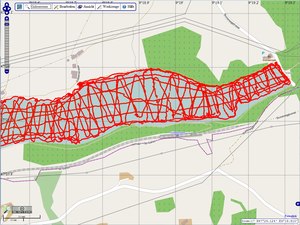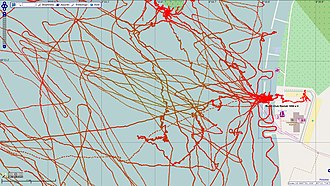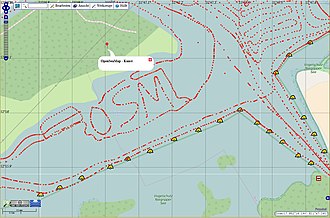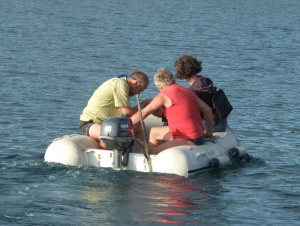h:En:Measuring Strategy: Unterschied zwischen den Versionen
Markus (Diskussion | Beiträge) K (→Chaotic Collection) |
Markus (Diskussion | Beiträge) (→About the Technique) |
||
| (4 dazwischenliegende Versionen desselben Benutzers werden nicht angezeigt) | |||
| Zeile 1: | Zeile 1: | ||
{|border="0" cellpadding="6" cellspacing="0" width="100%" | {|border="0" cellpadding="6" cellspacing="0" width="100%" | ||
| − | !style="background:#E3E3E3;" | [[ | + | !style="background:#E3E3E3;" | [[h:De:Mess-Strategie|Deutsch]] |
| − | !style="background:#E3E3E3;" | [[Measuring Strategy|English]] | + | !style="background:#E3E3E3;" | [[h:En:Measuring Strategy|English]] |
!style="background:#E3E3E3; width:100%;" | | !style="background:#E3E3E3; width:100%;" | | ||
|} | |} | ||
| Zeile 31: | Zeile 31: | ||
If you are at a mooring place, pier, or if you sway at anchor, don´t turn the logger off, so that a point cloud can develop. This helps us to calibrate the data. | If you are at a mooring place, pier, or if you sway at anchor, don´t turn the logger off, so that a point cloud can develop. This helps us to calibrate the data. | ||
| + | |||
| + | If there are already measurement tracks in your area: | ||
| + | * Concentrate on gaps and fill the "white spots". | ||
| + | * Fill the area between the track with the least depth and the coast - if your draft allows it. | ||
| + | * Everything between 5 and 2 meters is especially interesting! | ||
<gallery> | <gallery> | ||
| Zeile 67: | Zeile 72: | ||
* http://depth.openseamap.org/#introduction | * http://depth.openseamap.org/#introduction | ||
* Further pages in the Wiki: see box in the upper right corner | * Further pages in the Wiki: see box in the upper right corner | ||
| + | |||
| + | |||
| + | [[Kategorie:Depth]] | ||
Aktuelle Version vom 24. Januar 2025, 21:49 Uhr
| Deutsch | English |
|---|
| Water depth |
|---|
| Depth-Website |
| The project |
| Measuring strategy |
| Upload NMEA-data |
| Metadata help |
| Connecting NMEA-Logger |
| Hardware Logger |
| Software Logger |
| Mobile sounder |
| Ship network |
| Data formats |
Simply measure where you are at the moment.
There is nothing special to do :-)
Switch on the logger before you sail off
and let it run for another half an hour after you have arrived.
Inhaltsverzeichnis
Systematic Collection
We recommend to collect the data of your home port and the approach to the port systematically. Systematic collection is also advisable for anchorage bays, beaches, and buoy fields.
- Important
- navigate as close to the shore as your draft allows
- navigate as close to any shoal as your draft allows
- sail parallel lines in a distance of 10..50m
- mark shoals on the map
Chaotic Collection
In areas, where many skippers are on the way (for example at the fuel station in Palma, Mallorca), there will automatically be a dense collection of data by crowdsourcing. On the periphery of heavily frequenced ways, the density of measuring points is of course lower. In those cases of lower density, it helps to measure more systematically.
If you are at a mooring place, pier, or if you sway at anchor, don´t turn the logger off, so that a point cloud can develop. This helps us to calibrate the data.
If there are already measurement tracks in your area:
- Concentrate on gaps and fill the "white spots".
- Fill the area between the track with the least depth and the coast - if your draft allows it.
- Everything between 5 and 2 meters is especially interesting!
Collection under way
Sail your trip as usual.
Your track will be recorded automatically :-)
You can optimize the result:
- navigate as close to the shore as your draft allows,
also when you are tacking - navigate in a circle around a shoal as tight as possible
and a second circle a little bit further
and if possible, also sail through two shoals - especially interesting are ports, bays, capes,
passages through islands, and approaches.
So, if such a site is on your way: take it! - perform many manoeuvres in shallow water
- tack once in a while under motor in shallow water
Sometimes, an extra detour is an easy way to help ...
To cover interesting sites systematically (go around the port, looking for an anchoring place, go between buoys and anchoring ships)
navigate as close to the shore and to shoals as your draft allows.
Tacking and manoeuvres help to collect a broad track.
The most important data are those between 2 and 10m.
We analyse all data between 0 and 100m (200m).
Collection by Dinghy
With a dinghy, with mobile GPS and sounder, you can measure very shallow banks. This is perfect for ports and anchorage bays. Children and teens love to use laytimes for such rubber boat trips!
About the Technique
- http://depth.openseamap.org/#introduction
- Further pages in the Wiki: see box in the upper right corner





